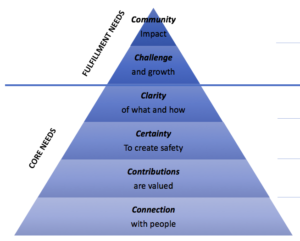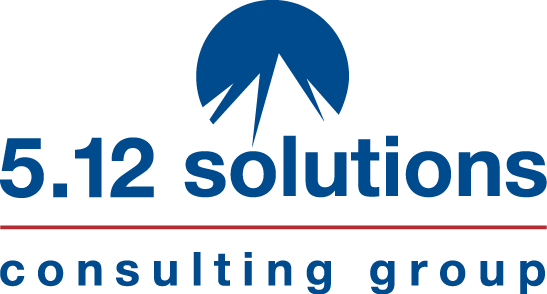More than a third of your employees might be actively searching for a new role.*
What would be the impact if you lost 33% of your employees within the next year? What knowledge, skills and abilities would flow out of your organization and into a competitor’s?
Statistics like this are directly at odds with what we often hear and see in the workplace through statements like “people are our most important asset,” “we are a people-first culture,” or “we treat people with respect here.”
There’s an obvious disconnect.
Empty statements like those prior examples above won’t cut it.
If we want to retain our top talent and create a healthy and aligned culture, we need to put humanity back into our workplace and recognize that people have very deep-rooted human needs.

And that’s why we developed our 6 Human Workplace Needs model — to give leaders a pathway to putting humanity back into the workplace.
In our last post, we focused on the first human workplace need: connection.
Connection goes to the root of what we all seek as people, regardless of gender, race or even geography. It speaks to our need for a sense of belonging and love. And in the workplace to have meaningful relationships with the people around us such as our manager, peers and others.
Today’s post is focused on the second human workplace need: contributions are valued.
Contributions Are Valued
I believe that one of the reasons why a third of your workforce might be looking for another role is that their second human need — the need for their contributions to be valued — is not being met.
At the end of the day, if leaders are only able to do one thing well, meeting this human need might be the most important. Employees want to know that their contributions are seen and appreciated.
They want to know that they are heard and that their opinions count.
And when they leave work for home, they want to feel and believe that they matter.
It’s not uncommon for me to hear leaders say, “Why should I recognize my people?” The next line out of their mouth is almost always, “That’s what they get paid for.”
There’s another disconnect.
It would be like going to a football, baseball or basketball game where nobody cheered until a player crossed the end zone, hit a home run or made that free throw.
That would be weird and not at all enjoyable. Yet it happens all the time at work.
The Fear Behind Contributions Not Being Valued
Several fears drive a human’s behavior related to needing to be valued in the workplace. They show up differently for different people, depending on life experiences, personality and more.
Some of the most common fears we hear related to contributions not being valued are:
“Am I good enough?” (a fear of unworthiness)
“Am I as good as someone else?” (comparison to others; fear of inadequacy)
“It has to be right before I contribute.” (perfectionism)
Regardless of how these fears show up, they usually boil down to one core fear: “Do I matter?”
When team members operate out of this fear of not knowing if they matter, they may start to compete with each other instead of collaborate; they may withhold information so that they can look smart and be seen as a valuable player; or they may focus more on their own needs, agenda, ego and area of the business instead of what the business needs most.
The fear of “do I matter” can be quite destructive to an organizational culture when it isn’t recognized and reframed.
How Leaders Can Help People Feel Like Their Contributions Matter
I. Mindset
As with any leadership behavior, the mindset has to evolve or behavior change will not follow. To truly create an environment where employees feel valued, a leader’s mindset has to shift in the following ways:
- The leader has to evolve how they see and think about power. The shift is from power over others to sharing power with others.
- The leader has to recognize that people want to know that they are enough and that they matter.
- The leader has to see that recognition is part of their role as a leader.
II. Skillset
Leaders who value the contributions that employees make in the workplace have two key skillsets. First of all, they are able to move beyond a one-size-fits-all approach in their leadership style and adapt to the needs of different people based on personality, preferences, motivations and cultural needs. They are able to adapt their approach to how they recognize, motivate and develop their people.
Secondly, leaders must have a working knowledge of compensation strategy, or at least be able to access resources that do, to ensure their compensation model is aligned with similar roles in other organizations. Compensation matters and is still one of the top reasons why people leave organizations.
III. Daily Habits
A leader’s mindset and skillset are demonstrated through their actions every day.
Some examples of daily habits that ensure a team member’s contributions are valued might include:
- Implementing a recognition strategy
- Making daily recognition rounds
- Adapting how people are recognized based on their specific preferences
- Showing genuine interest in people’s lives
- Making time for regular 1-1s, goal reviews and coaching
- Rewarding team members when they model behavior that demonstrates they value other employees
- Setting behavioral expectations that are aligned with clearly defined norms and values
- Organizing events outside of work where people can just be human
- Giving team members a voice by asking for and valuing their opinions
- Inviting team members to their home
Tammy Krings, one of our most talented coaches and trainers and founder of Conversations that Matter, joined me in a recent podcast interview on my show Sal Silvester on the Future of Leadership. Tammy and I spoke extensively about insecurities that people bring into the workplace and how that impacts their performance. We also leveraged the DiSC model to show a pathway for helping leaders better adapt to their people by understanding what matters most to people based on personality styles.
Value Your Contributions Yourself
You don’t have to rely on others to value yourself and the contributions you make every day. You have it within you to take steps to get this need met in your own life.
First of all, notice the stories you might be telling yourself. What stories do you tell yourself about “not being enough”? How do those stories impact your behavior at work and at home? Do you spend time overthinking how others perceive you? Are you overly concerned about how you compare with others?
Secondly, take some small, but meaningful, steps to value yourself and the contributions you already make.
- Create goals and track your progress toward those goals.
- Make a list of all the things you’ve accomplished in any given day, week or month.
- Stop being so hard on yourself. Really, you are your own worst critic.
- Change your language to words that truly empower instead of disparage yourself.
- Give yourself permission to fail, make mistakes and then learn.
- Ask for feedback from your boss, peers and others.
- Ask for feedforward — ideas and suggestions for the future.
- Be grateful.
People Matter
Helping people meet the need of knowing that their contributions matter is not rocket science. But it does take intention.
And it does have an impact, especially if 33% of your workforce might be actively or casually looking for another role.
If you are looking to build more connection in your work environment and help your leaders learn how to value the contributions that your employees make, check out our leadership development and team acceleration services. We can help your organization get there faster.
*LinkedIn Talent Solutions; Ceridien

